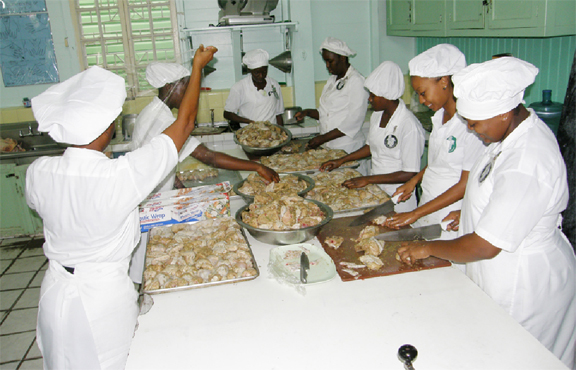Some institutions in Guyana, for reasons associated with their longevity and the contribution to the growth and development of the Guyanese society engender a special sense of history. The Carnegie School of Home Economics is one such institution. Currently in the 80th year, its contribution to training Guyanese women in marketable skills is summed up in an anniversary message from the Chairman of the Board of the institution who declared that the School “has played and continues to play a leading role in the training of persons in the culinary arts, hospitality and human development in general.”
What is perhaps most remarkable about the CSHE is its retention of a particular relevance to Guyana’s development over eight decades, its contemporary role being reflected in the number of persons who continue to secure training at the institution prerparatory to finding employment in the tourism and hospitality sectors.

CSHE Principal Penelope Harris
The School was founded by a Scotsman Andrew Carnegie its primary original purpose being to provide marketable skills options for persons who had not demonstrated a strong academic aptitude. The curriculum covered a range of disciplines associated with the domestic sciences including sewing, cooking and general housekeeping and the institution quickly became a training ground for restaurants, hotels and Colonial homes. Funding, according to the records of ther institution, “was the responsibility of the Carnegie Board of Trustees and later the United Kingdom Trust Funds.”
Some of the names of personages who became Principal of the School include the first Principal, the UK—born Beatrix Briant. Lucille Fraser-Wharton became the institution’s first local Principal and she was followed by Magda Pollard, Lynnette Sylvester, Aulene Kilkelly, Roxanne Benjamin-Hoppie, Norma Washington and, currently, Penelope Harris.
The current Principal writes that “during the period 1937 – 1958, the Carnegie Trade School (as it was then known) made a decision to commercialize its operations by producing custom- made ladies’ garments and uniforms for the government sector employees. Large scale catering was also undertaken on request. In 1957 the name Trade School for Women was really a misnomer since male cooks, mess men and stewards for local coastal shipping may be trained here by request. Thus the name of the school was changed to the ‘Carnegie School of Home Economics.”
The Founder, Andrew Carnegie
According to Harris, CSHE also initiated a Home Economics Emergency Training Programme for teachers and was officially linked to the Ministry of Education. The earlier adjustment to the curriculum to include subjects such as Arithmetic, English, Social Studies, Geography, Art and Craft, Home Management, Food and Nutrition and Clothing and Textiles was a reflection of a change in the focus of education to ensure according to Harris that “every girl got an opportunity to learn all the skills and attitudes necessary for a good home, family and community life.”
There began an interlude of significant intervention in the training curriculum for teachers. Ms. Harris writes: “students at the Government Training College for Teachers received some training for delivering the Domestic Science programme to students, centered largely around the Food Preparation Curriculum. The Principal and Deputy Principal, Misses Kathleen Gunn and Lucille Fraser-Wharton, respectively, were the facilitators and Misses Cicely Phillips and Olga Britton were the tutors. This training was later extended to include persons from both public and private institutions and private citizens. However, the main target groups were students on a full time and later a part time basis. There were some 650 people including men in village groups enjoying this facility.”
Since the 1970’s the CSHE’s catering service has been continually upgraded and professionalized in order to allow for more specialized training in food preparation and the public was afforded the opportunity of dining at a local restaurant – known as the Hibiscus Restaurant – run by local professionals. The School benefited from financial assistance through the Association of Canadian Community College (ACCC) and the Canadian International Development Association (CIDA).

The turn of the century coincided with further changes at the CSHE. “The classroom,” Ms. Harris writes, “has been about improving the student’s awareness of values, attitudes and skills needed for individuals, families, communities and generally industries.” She goes on: “In 2012, there was a shift towards modernizing all the programmes. In this regard, the institution now offers the certificate in Commercial Food preparation and General Cosmetology. It also offers part time courses in interior decoration.”
The Carnegie School of Home Economics remains the leading training institution in the local Catering and Hospitality Industry, equipping the expanding tourism and hospitality sector with skilled persons trained in a broad range of relevant disciplines. The principal says that the School is striving “to create a student-friendly environment where the priority is to the students, who will in turn deliver quality goods and service as they strive to uphold the motto ‘We strive for better homes.’








